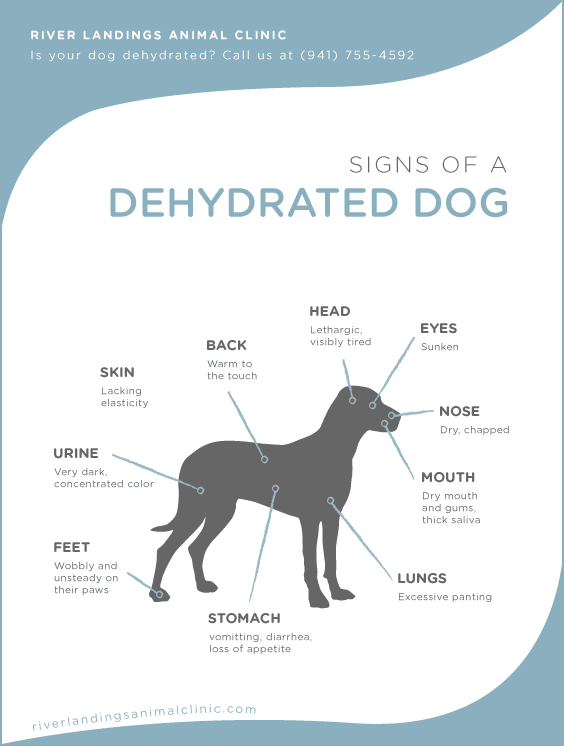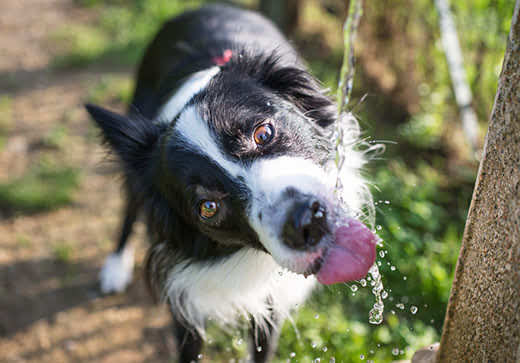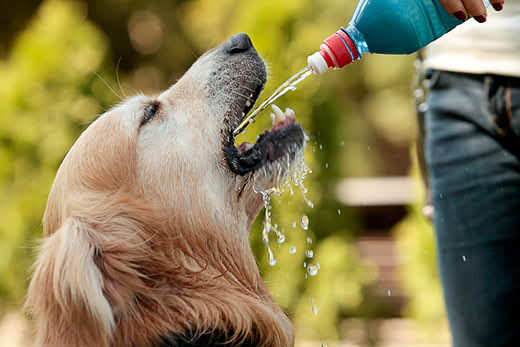
Dehydration in a dog: symptoms and treatment
Dehydration in dogs is a serious condition that should never be ignored. The body of a dog is 60-70% water and its importance should not be neglected.
Dehydration occurs when a dog’s body loses more fluid than it receives, and there is not enough water in the dog’s blood. In such cases, the electrolyte balance in the pet’s body is disturbed. This negatively affects the ability of muscles and internal organs to function normally. How do you know if a dog is dehydrated?
Contents
How to know if a dog is dehydrated
 To check if a dog has enough fluid in his body, you can use the following classic trick: gently pull the skin on the back of the dog’s head and then release. If the skin quickly returns to normal, then everything is in order. If the fold unfolds slowly or remains in a retracted position, the animal may be dehydrated.
To check if a dog has enough fluid in his body, you can use the following classic trick: gently pull the skin on the back of the dog’s head and then release. If the skin quickly returns to normal, then everything is in order. If the fold unfolds slowly or remains in a retracted position, the animal may be dehydrated.
The main problem with this test is that by the time a dehydrated dog’s skin stops stretching, its body tissues have already lost so much moisture that it can lead to damage to internal organs. A sign of milder dehydration that can be tested is dry gums. If a dog’s gums feel dry and sticky, this usually indicates that he may be slightly dehydrated. In addition, the skin pull test may not work in older dogs or dogs with hormonal imbalances that affect skin elasticity.
Other clinical signs of dehydration in dogs include:
- Rapid pulse.
- Excessive fatigue or lethargy.
- Staggering when standing up or walking.
- Gums that appear dark red or pale.
- Sunken, dull eyes.
If any of these signs occur, call your veterinarian immediately and take your dog to the clinic as soon as possible. Dehydration is a serious condition that requires immediate treatment.
The dog has dehydration: what to do
Mild dehydration in dogs that drink normally can be relieved by offering them small amounts of water. If your dog is vomiting or unable to hold water, give him some ice and seek the advice of a veterinarian. Most likely, he will ask to bring her for examination.
Moderate to severe dehydration is treated with intravenous or subcutaneous fluid therapy. Do injections or put droppers should be carefully and under the supervision of a veterinarian. If rehydration occurs too quickly, or the owner injects too much fluid into the dog, this can cause additional health problems for the animal.
 If dehydration is caused by a primary pathology, the underlying disease must be treated, otherwise dehydration is likely to recur. Any environmental factor or health condition that affects a dog’s water balance can lead to dehydration.
If dehydration is caused by a primary pathology, the underlying disease must be treated, otherwise dehydration is likely to recur. Any environmental factor or health condition that affects a dog’s water balance can lead to dehydration.
This condition can be caused by vomiting, diarrhea, liver and kidney disease, high fever, poor diet and insufficient drinking, as well as hormonal disorders such as diabetes. With so many possible underlying causes, it’s especially important to see your veterinarian on time.
If a specialist suspects a medical condition that is the underlying cause of dehydration, they may recommend further testing. For example, a blood test, a urinalysis, or an imaging test such as an X-ray or ultrasound of the abdomen. Such studies will help to establish the root cause and choose the appropriate treatment.
At the first sign of dehydration, you need to get an emergency appointment with a veterinarian. As a rule, the prognosis is favorable.
Prevention of dehydration in dogs
Fortunately, if you provide your pet with constant access to clean water, he will drink as much as he needs without any intervention from you. On hot summer days, offer your dog more water to help keep him cool, as heat stroke can also lead to dehydration. When the temperature outside is high, it is important to make sure that the dog has access to enough clean drinking water at all times. For the duration of the walk, it is worth taking a bottle of water with you and some other utensils from which it will be convenient for the pet to drink.
How much water should a dog drink
In general, dogs should drink about 50 ml of water per kg of their body weight daily. If a dog weighs 10 kg, he should drink approximately 500 ml of fluid every day, and if he weighs 25 kg, he should drink approximately 2,5 liters of fluid per day. Under certain pathological conditions, such as diabetes and kidney disease, an animal can drink a lot of water and still suffer from dehydration. If your dog suddenly starts drinking more than usual, you should talk to your veterinarian to rule out serious illness.
Dehydration in pets can be a life-threatening condition, but if you know the signs, you can spot it before it becomes a serious problem. In this case, you should seek the help of a veterinarian, who will help prevent any further problems associated with dehydration in your four-legged friend.





